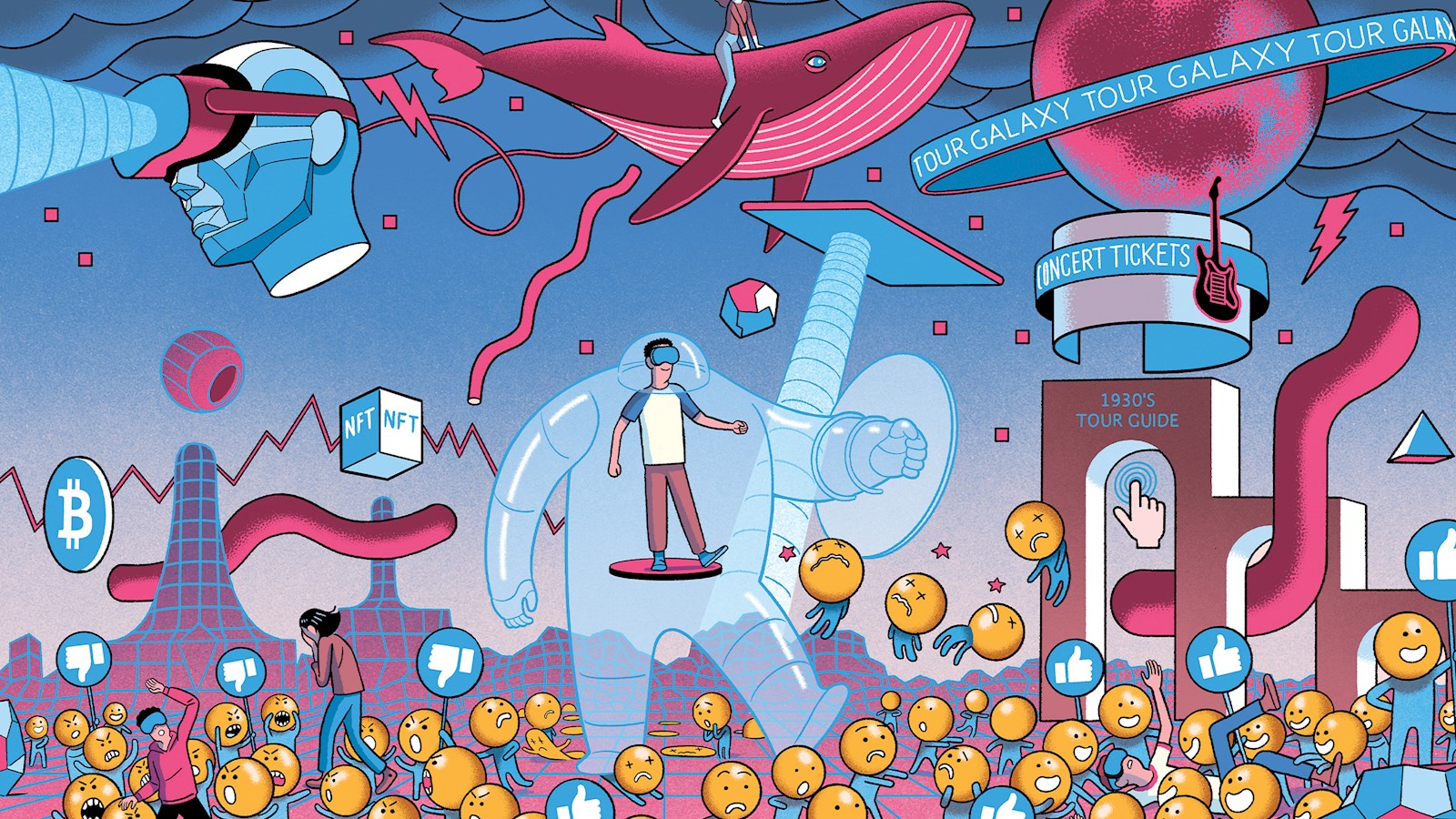
An escapist’s dream: the metaverse
The metaverse can only ever be as safe as we allow ourselves to be, says Friederike Sandow. But we don’t need to safeguard fantasy, we need to safeguard ourselves
People have always sought to create spaces that let us invent something new, that let us dream bigger and bigger, improve us and our environment, that let us be reckless, be famous, be someone else.
Throughout history, people have sought to escape their lives, just for fleeting moments, with entertainment like plays, books, fairs. They wanted to feel more excited, to be seen, to dream of a better world. Whether in ancient Greece, in clubs and bars, or role-playing in games like Dungeons and Dragons, people wanted to get lost in a moment and feel nothing – or something. They wanted to escape from realities that are too much, that are hurtful, depressing, overbearing – or just a little bit boring.
I still remember my first e-card. I was 11 years old and a boy I liked had sent me one in our computer and science class. It just said: “Hi, how are you?” But it meant the world.
I also still remember my father trying to tell me what the internet meant to him. The first thing he showed me was a recording of the famous words spoken by the Apollo 13 crew: “Houston, we have a problem.”
He was giddy, like a child on Christmas Day, because he was discovering a playground that he didn’t think was possible. For him, the internet meant absolute knowledge and awe. For my generation, the internet meant fun, because we grew up with Tamagotchis, The SIMS and – for hardcore fans – Second Life.
Pushing the limits
When we talk about the metaverse today, we think we know what it means, but I doubt that we really understand what it can do, what it can be, where it starts, and where it ends. It is as thrilling as it is worrying. It seems like someone, someplace, has pushed the limits of the digital world even further than we thought possible.
And yet, the metaverse can never provide us with food, a human touch, or light – or at least I cannot imagine it doing so in my lifetime. It cannot provide us with life, but it is also not going away. It is expanding, it is seeping into our lives, into our communication, into how we do business, how we discover music, how we own art – and how we escape. It is also reaching into how we fantasise. If done right, there are endless possibilities for fuelling our fantasies. But fantasies are difficult to safeguard. And I don’t think they should be.
We don’t need to safeguard fantasy, but we do need to safeguard ourselves. We also need to safeguard safe spaces. A safe space is not defined by control or limits, it is defined by morals. We need to safeguard justice, equality, mental health.
We have all spent the last two years – longer in fact – in the metaverse of Zoom, Microsoft Teams, Twitter, Instagram and TikTok. We avoided travel and seeing our loved ones. We starved ourselves of normality. But we have laughed, cried, won, lost, worked, forgotten to eat, and risked sleep deprivation in our very individual, little metaverses. We’ve done this to avoid eating out together, to avoid touching, to avoid letting laughter and words travel through rooms.
To be able to safeguard a metaverse, we need to start learning to safeguard ourselves – and especially each other. Because, if done right, the idea of a metaverse that goes beyond the World of Warcraft, attending a virtual concert and owning NFTs, can provide deep experiences, excitement and possibilities.
What if one day we could revisit lost ones because we recorded their mannerisms, speech and looks? What if someone living with a disability could walk and jump and dive into the ocean? What if I could talk to an eyewitness from the 1930s to deepen my knowledge of history?
There is no solution
I have no 10-point plan on how to safeguard the metaverse, but if we all really, really wanted to do so, it would be remarkably easy. It comes down to the question of what we are willing to give up – money, space, time, power?
A metaverse cannot provide a fresh start or a better world if the same people continue to occupy the seats of power. We need to make space for fair representation, and for prioritising mental health over profit.
Instead of a solution, there are questions. Did we all make enough space? Did we do enough listening? Did we make people feel comfortable enough to speak? Did we try to change our ways? Are we willing to learn? If the answer to these questions is “no”, the metaverse will be a playground for the privileged, and the rest will have to find new ways of escaping.
Read more from Atticus Journal Volume 27
published on
28 December 2022
Category
More in Technology & data

How to build your brand in-game
A new research report from WPP and SuperAwesome

WPP puts itself at the heart of collaborative 3D worlds
Pixar's 3D animation file format – USD – is the invisible building block of our digital 3D future.

A clarion call for AI, accessibility & advertising
Innovating at the intersection of AI, accessibility, and advertising

